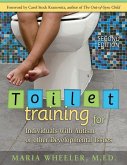Jed Baker
Preparing for Life
Jed Baker
Preparing for Life
- Broschiertes Buch
- Merkliste
- Auf die Merkliste
- Bewerten Bewerten
- Teilen
- Produkt teilen
- Produkterinnerung
- Produkterinnerung
A bestselling author and counselor offers a comprehensive resource for students on the autism spectrum preparing for life after high school. This handbook focuses on "life skills training" on such subjects as nonverbal cues, body language, dealing with anger, and building and maintaining friendships and intimate relationships. Includes assessment tools for parents and analysis of laws that provide accommodations to adults with disabilities.
Andere Kunden interessierten sich auch für
![Early Intervention and Autism: Real-Life Questions, Real-Life Answers Early Intervention and Autism: Real-Life Questions, Real-Life Answers]() James BallEarly Intervention and Autism: Real-Life Questions, Real-Life Answers23,99 €
James BallEarly Intervention and Autism: Real-Life Questions, Real-Life Answers23,99 €![Toilet Training for Individuals with Autism or Other Developmental Issues: Second Edition Toilet Training for Individuals with Autism or Other Developmental Issues: Second Edition]() Maria WheelerToilet Training for Individuals with Autism or Other Developmental Issues: Second Edition21,99 €
Maria WheelerToilet Training for Individuals with Autism or Other Developmental Issues: Second Edition21,99 €![Autism, Adolescence, and Adulthood Autism, Adolescence, and Adulthood]() Bobbi BarberAutism, Adolescence, and Adulthood15,99 €
Bobbi BarberAutism, Adolescence, and Adulthood15,99 €![Aid - Autism Inventory of Development Aid - Autism Inventory of Development]() Roya OstovarAid - Autism Inventory of Development18,99 €
Roya OstovarAid - Autism Inventory of Development18,99 €![The Way I See It: 5th Edition: Revised & Expanded The Way I See It: 5th Edition: Revised & Expanded]() Temple GrandinThe Way I See It: 5th Edition: Revised & Expanded23,99 €
Temple GrandinThe Way I See It: 5th Edition: Revised & Expanded23,99 €![A Parent's Guide to Early Intervention: A Comprehensive Model for Children with Special Needs A Parent's Guide to Early Intervention: A Comprehensive Model for Children with Special Needs]() Alex LiauA Parent's Guide to Early Intervention: A Comprehensive Model for Children with Special Needs22,99 €
Alex LiauA Parent's Guide to Early Intervention: A Comprehensive Model for Children with Special Needs22,99 €![Autism After the Pandemic: A Step by Step Guide to Successfully Transition Back to School and Work Autism After the Pandemic: A Step by Step Guide to Successfully Transition Back to School and Work]() James BallAutism After the Pandemic: A Step by Step Guide to Successfully Transition Back to School and Work14,99 €
James BallAutism After the Pandemic: A Step by Step Guide to Successfully Transition Back to School and Work14,99 €-
-
-
A bestselling author and counselor offers a comprehensive resource for students on the autism spectrum preparing for life after high school. This handbook focuses on "life skills training" on such subjects as nonverbal cues, body language, dealing with anger, and building and maintaining friendships and intimate relationships. Includes assessment tools for parents and analysis of laws that provide accommodations to adults with disabilities.
Hinweis: Dieser Artikel kann nur an eine deutsche Lieferadresse ausgeliefert werden.
Hinweis: Dieser Artikel kann nur an eine deutsche Lieferadresse ausgeliefert werden.
Produktdetails
- Produktdetails
- Verlag: Future Horizons
- Seitenzahl: 357
- Altersempfehlung: 16 bis 17 Jahre
- Erscheinungstermin: Januar 2006
- Englisch
- Abmessung: 279mm x 215mm x 27mm
- Gewicht: 1229g
- ISBN-13: 9781932565331
- ISBN-10: 1932565337
- Artikelnr.: 21620802
- Herstellerkennzeichnung
- Produktsicherheitsverantwortliche/r
- Europaallee 1
- 36244 Bad Hersfeld
- gpsr@libri.de
- Verlag: Future Horizons
- Seitenzahl: 357
- Altersempfehlung: 16 bis 17 Jahre
- Erscheinungstermin: Januar 2006
- Englisch
- Abmessung: 279mm x 215mm x 27mm
- Gewicht: 1229g
- ISBN-13: 9781932565331
- ISBN-10: 1932565337
- Artikelnr.: 21620802
- Herstellerkennzeichnung
- Produktsicherheitsverantwortliche/r
- Europaallee 1
- 36244 Bad Hersfeld
- gpsr@libri.de
Having earned his MA and Ph.D. in clinical psychology from the University of Albany, Dr. Jed Baker is a behavioral consultant for several New Jersey school districts where, nearly two decades ago, he organized a group to help children with social communication problems. That group expanded and ultimately became the Social Skills Training Project under Dr. Baker's directorship. Dr. Baker also presents lectures all over the world on social skills training, and is on the board of directors of the Asperger's Syndrome Education Network, Inc. (ASPEN). His work has been featured on ABC News and Nightline.
Chapter One: Asperger's Syndrome, autism disorders, and the need for life
skills training Chapter Two: The transition process and the law Chapter
Three: Self-awareness and moving beyond denial Chapter Four: College,
Career and Residential Options Beyond High School: What parents can do to
prepare their son or daughter (by Rick Blumberg, Ph.D.) Chapter Five:
Assessment of social skill needs Chapter Six: Skill instruction strategies:
Individual, small group, self-instruction Chapter Seven: Generalization of
skills Chapter Eight: Training peers to be more accepting of students on
the spectrum Chapter Nine: Skill Lessons Nonverbal cues/body language 1.
Expressing and reading welcoming versus unwelcoming social cues. 2.
Interest versus boredom social cues 3. Sarcasm versus genuine expressions
4. Attending to others 5. Respecting personal space and belongings 6.
Personal hygiene 7. Dealing with odd motor mannerisms Dealing with
anger/frustration 8. Overview of dealing with anger 9. Identifying triggers
to your anger 10. Altering or avoiding the triggers to your anger 11.
Better ways to think about and deal with the triggers to your anger. 12.
Calming yourself when angry 13. Talking versus acting out your feelings 14.
Putting it all together: Using the Daily Anger Record Dealing with anxiety
15. Dealing with anxiety and fear 16. Dealing with unpleasant, intrusive
thoughts and compulsive behaviors 17. Dealing with social fears 18. Dealing
with new feared situations Conversation 19. Saying hello's and goodbye's
20. Introductions 21. Politely interrupting 22. Maintaining and joining a
conversation 23. Starting conversations with people you know 24. Getting to
know someone new 25. POSTER: Summary of Starting and Maintaining
Conversations 26. Conversation repair strategies 27. Politely changing
topics 28. Being sensitive to the listener's interests 29. Politely ending
conversations 30. Answering the telephone and taking messages 31. Calling
friends on the telephone Building and maintaining friendships (and dealing
with roommates) 32.Where to find friends 33.Don't try too hard too soon
34.Sharing friends 35.Avoiding touchy subjects and insults 36.
Complimenting 37. Respecting others' views 38. Don't impose rules on others
(minding your own business) 39. Avoid bragging 40. Dealing with peer
pressure and avoiding setups 41. Empathic listening 42. Showing caring for
others' feelings through supportive statements. 43. Deepening
relationships-sharing personal information 44. Conflict
resolution/Assertiveness 45. Dealing with teasing 46. Showing good
sportsmanship 47. Getting attention in positive ways Dating 48. Where to
find a date and how and when to ask someone on a Date 49. Asking someone
out on a date 50. Reading the signals-when to pursue a romantic
relationship 51. Sexual harassment 52. Do's and Don'ts on a date 53.
Communicating clearly to meet each other's needs Dealing with school and
family demands 54. Asking for reasonable modifications 55. Dealing with
frustrating work 56. Accepting no or waiting for what you want 57. Asking
nicely for what you want 58. Working cooperatively in groups 59. Dealing
with mistakes and correction 60. How to respectfully disagree with
teachers, parents, or supervisors 61. Dealing with stressful living
situations Employment Skills 62. Choosing job/career directions 63.
Conducting a job search 64. Writing a resume and cover letters 65. Scripts
for networking with friends, relatives, and potential employers 66.
Interview skills (and whether to disclose a disability) 67. Handling
rejection 68. Do's and Don'ts to maintain a job 69. Responding to
criticisms, accusations, or complaints on the job 70. Exiting a job Money
Matters 71. Managing money Preparing for emergencies 72. Dealing with
emergencies and emergency workers (such as police or hospital workers)
Transportation 73. Negotiating transportation
skills training Chapter Two: The transition process and the law Chapter
Three: Self-awareness and moving beyond denial Chapter Four: College,
Career and Residential Options Beyond High School: What parents can do to
prepare their son or daughter (by Rick Blumberg, Ph.D.) Chapter Five:
Assessment of social skill needs Chapter Six: Skill instruction strategies:
Individual, small group, self-instruction Chapter Seven: Generalization of
skills Chapter Eight: Training peers to be more accepting of students on
the spectrum Chapter Nine: Skill Lessons Nonverbal cues/body language 1.
Expressing and reading welcoming versus unwelcoming social cues. 2.
Interest versus boredom social cues 3. Sarcasm versus genuine expressions
4. Attending to others 5. Respecting personal space and belongings 6.
Personal hygiene 7. Dealing with odd motor mannerisms Dealing with
anger/frustration 8. Overview of dealing with anger 9. Identifying triggers
to your anger 10. Altering or avoiding the triggers to your anger 11.
Better ways to think about and deal with the triggers to your anger. 12.
Calming yourself when angry 13. Talking versus acting out your feelings 14.
Putting it all together: Using the Daily Anger Record Dealing with anxiety
15. Dealing with anxiety and fear 16. Dealing with unpleasant, intrusive
thoughts and compulsive behaviors 17. Dealing with social fears 18. Dealing
with new feared situations Conversation 19. Saying hello's and goodbye's
20. Introductions 21. Politely interrupting 22. Maintaining and joining a
conversation 23. Starting conversations with people you know 24. Getting to
know someone new 25. POSTER: Summary of Starting and Maintaining
Conversations 26. Conversation repair strategies 27. Politely changing
topics 28. Being sensitive to the listener's interests 29. Politely ending
conversations 30. Answering the telephone and taking messages 31. Calling
friends on the telephone Building and maintaining friendships (and dealing
with roommates) 32.Where to find friends 33.Don't try too hard too soon
34.Sharing friends 35.Avoiding touchy subjects and insults 36.
Complimenting 37. Respecting others' views 38. Don't impose rules on others
(minding your own business) 39. Avoid bragging 40. Dealing with peer
pressure and avoiding setups 41. Empathic listening 42. Showing caring for
others' feelings through supportive statements. 43. Deepening
relationships-sharing personal information 44. Conflict
resolution/Assertiveness 45. Dealing with teasing 46. Showing good
sportsmanship 47. Getting attention in positive ways Dating 48. Where to
find a date and how and when to ask someone on a Date 49. Asking someone
out on a date 50. Reading the signals-when to pursue a romantic
relationship 51. Sexual harassment 52. Do's and Don'ts on a date 53.
Communicating clearly to meet each other's needs Dealing with school and
family demands 54. Asking for reasonable modifications 55. Dealing with
frustrating work 56. Accepting no or waiting for what you want 57. Asking
nicely for what you want 58. Working cooperatively in groups 59. Dealing
with mistakes and correction 60. How to respectfully disagree with
teachers, parents, or supervisors 61. Dealing with stressful living
situations Employment Skills 62. Choosing job/career directions 63.
Conducting a job search 64. Writing a resume and cover letters 65. Scripts
for networking with friends, relatives, and potential employers 66.
Interview skills (and whether to disclose a disability) 67. Handling
rejection 68. Do's and Don'ts to maintain a job 69. Responding to
criticisms, accusations, or complaints on the job 70. Exiting a job Money
Matters 71. Managing money Preparing for emergencies 72. Dealing with
emergencies and emergency workers (such as police or hospital workers)
Transportation 73. Negotiating transportation
Chapter One: Asperger's Syndrome, autism disorders, and the need for life
skills training Chapter Two: The transition process and the law Chapter
Three: Self-awareness and moving beyond denial Chapter Four: College,
Career and Residential Options Beyond High School: What parents can do to
prepare their son or daughter (by Rick Blumberg, Ph.D.) Chapter Five:
Assessment of social skill needs Chapter Six: Skill instruction strategies:
Individual, small group, self-instruction Chapter Seven: Generalization of
skills Chapter Eight: Training peers to be more accepting of students on
the spectrum Chapter Nine: Skill Lessons Nonverbal cues/body language 1.
Expressing and reading welcoming versus unwelcoming social cues. 2.
Interest versus boredom social cues 3. Sarcasm versus genuine expressions
4. Attending to others 5. Respecting personal space and belongings 6.
Personal hygiene 7. Dealing with odd motor mannerisms Dealing with
anger/frustration 8. Overview of dealing with anger 9. Identifying triggers
to your anger 10. Altering or avoiding the triggers to your anger 11.
Better ways to think about and deal with the triggers to your anger. 12.
Calming yourself when angry 13. Talking versus acting out your feelings 14.
Putting it all together: Using the Daily Anger Record Dealing with anxiety
15. Dealing with anxiety and fear 16. Dealing with unpleasant, intrusive
thoughts and compulsive behaviors 17. Dealing with social fears 18. Dealing
with new feared situations Conversation 19. Saying hello's and goodbye's
20. Introductions 21. Politely interrupting 22. Maintaining and joining a
conversation 23. Starting conversations with people you know 24. Getting to
know someone new 25. POSTER: Summary of Starting and Maintaining
Conversations 26. Conversation repair strategies 27. Politely changing
topics 28. Being sensitive to the listener's interests 29. Politely ending
conversations 30. Answering the telephone and taking messages 31. Calling
friends on the telephone Building and maintaining friendships (and dealing
with roommates) 32.Where to find friends 33.Don't try too hard too soon
34.Sharing friends 35.Avoiding touchy subjects and insults 36.
Complimenting 37. Respecting others' views 38. Don't impose rules on others
(minding your own business) 39. Avoid bragging 40. Dealing with peer
pressure and avoiding setups 41. Empathic listening 42. Showing caring for
others' feelings through supportive statements. 43. Deepening
relationships-sharing personal information 44. Conflict
resolution/Assertiveness 45. Dealing with teasing 46. Showing good
sportsmanship 47. Getting attention in positive ways Dating 48. Where to
find a date and how and when to ask someone on a Date 49. Asking someone
out on a date 50. Reading the signals-when to pursue a romantic
relationship 51. Sexual harassment 52. Do's and Don'ts on a date 53.
Communicating clearly to meet each other's needs Dealing with school and
family demands 54. Asking for reasonable modifications 55. Dealing with
frustrating work 56. Accepting no or waiting for what you want 57. Asking
nicely for what you want 58. Working cooperatively in groups 59. Dealing
with mistakes and correction 60. How to respectfully disagree with
teachers, parents, or supervisors 61. Dealing with stressful living
situations Employment Skills 62. Choosing job/career directions 63.
Conducting a job search 64. Writing a resume and cover letters 65. Scripts
for networking with friends, relatives, and potential employers 66.
Interview skills (and whether to disclose a disability) 67. Handling
rejection 68. Do's and Don'ts to maintain a job 69. Responding to
criticisms, accusations, or complaints on the job 70. Exiting a job Money
Matters 71. Managing money Preparing for emergencies 72. Dealing with
emergencies and emergency workers (such as police or hospital workers)
Transportation 73. Negotiating transportation
skills training Chapter Two: The transition process and the law Chapter
Three: Self-awareness and moving beyond denial Chapter Four: College,
Career and Residential Options Beyond High School: What parents can do to
prepare their son or daughter (by Rick Blumberg, Ph.D.) Chapter Five:
Assessment of social skill needs Chapter Six: Skill instruction strategies:
Individual, small group, self-instruction Chapter Seven: Generalization of
skills Chapter Eight: Training peers to be more accepting of students on
the spectrum Chapter Nine: Skill Lessons Nonverbal cues/body language 1.
Expressing and reading welcoming versus unwelcoming social cues. 2.
Interest versus boredom social cues 3. Sarcasm versus genuine expressions
4. Attending to others 5. Respecting personal space and belongings 6.
Personal hygiene 7. Dealing with odd motor mannerisms Dealing with
anger/frustration 8. Overview of dealing with anger 9. Identifying triggers
to your anger 10. Altering or avoiding the triggers to your anger 11.
Better ways to think about and deal with the triggers to your anger. 12.
Calming yourself when angry 13. Talking versus acting out your feelings 14.
Putting it all together: Using the Daily Anger Record Dealing with anxiety
15. Dealing with anxiety and fear 16. Dealing with unpleasant, intrusive
thoughts and compulsive behaviors 17. Dealing with social fears 18. Dealing
with new feared situations Conversation 19. Saying hello's and goodbye's
20. Introductions 21. Politely interrupting 22. Maintaining and joining a
conversation 23. Starting conversations with people you know 24. Getting to
know someone new 25. POSTER: Summary of Starting and Maintaining
Conversations 26. Conversation repair strategies 27. Politely changing
topics 28. Being sensitive to the listener's interests 29. Politely ending
conversations 30. Answering the telephone and taking messages 31. Calling
friends on the telephone Building and maintaining friendships (and dealing
with roommates) 32.Where to find friends 33.Don't try too hard too soon
34.Sharing friends 35.Avoiding touchy subjects and insults 36.
Complimenting 37. Respecting others' views 38. Don't impose rules on others
(minding your own business) 39. Avoid bragging 40. Dealing with peer
pressure and avoiding setups 41. Empathic listening 42. Showing caring for
others' feelings through supportive statements. 43. Deepening
relationships-sharing personal information 44. Conflict
resolution/Assertiveness 45. Dealing with teasing 46. Showing good
sportsmanship 47. Getting attention in positive ways Dating 48. Where to
find a date and how and when to ask someone on a Date 49. Asking someone
out on a date 50. Reading the signals-when to pursue a romantic
relationship 51. Sexual harassment 52. Do's and Don'ts on a date 53.
Communicating clearly to meet each other's needs Dealing with school and
family demands 54. Asking for reasonable modifications 55. Dealing with
frustrating work 56. Accepting no or waiting for what you want 57. Asking
nicely for what you want 58. Working cooperatively in groups 59. Dealing
with mistakes and correction 60. How to respectfully disagree with
teachers, parents, or supervisors 61. Dealing with stressful living
situations Employment Skills 62. Choosing job/career directions 63.
Conducting a job search 64. Writing a resume and cover letters 65. Scripts
for networking with friends, relatives, and potential employers 66.
Interview skills (and whether to disclose a disability) 67. Handling
rejection 68. Do's and Don'ts to maintain a job 69. Responding to
criticisms, accusations, or complaints on the job 70. Exiting a job Money
Matters 71. Managing money Preparing for emergencies 72. Dealing with
emergencies and emergency workers (such as police or hospital workers)
Transportation 73. Negotiating transportation








